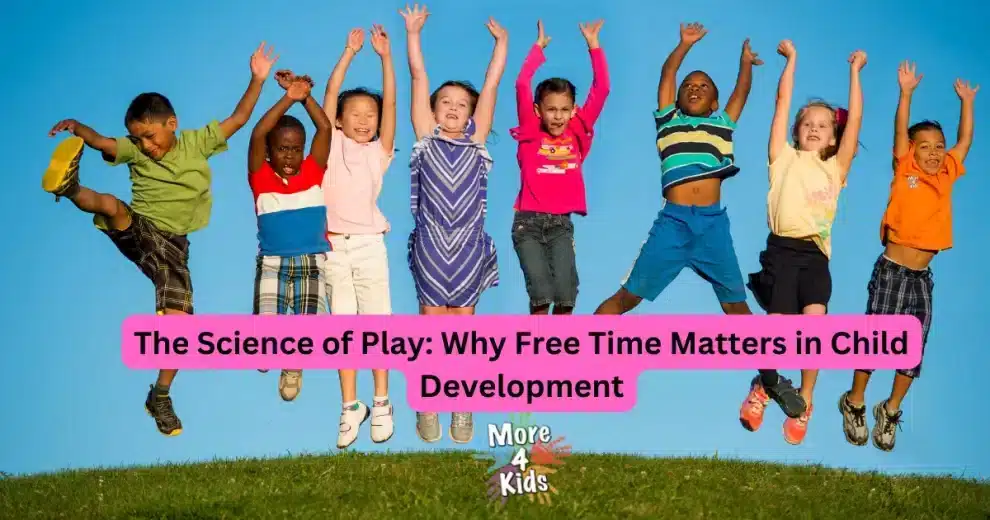Play is not just a frivolous activity reserved for children; it is a fundamental aspect of human development. From the early stages of life, play serves as a gateway to learning, creativity, and socialization. As adults, we often find ourselves detached from the world of play, buried under responsibilities and routines. Rediscovering the joys of play can not only benefit us but also provide an opportunity to connect with our children on a deeper level.
Whether your children play indoors, play outdoors in the park or at the beach, free time to play matters. In this article, we will explore the science and psychology behind play, highlighting its physiological and psychological benefits. We will delve into the importance of free time for play in a child’s schedule, and discuss how play contributes to cognitive, emotional, and social development. Furthermore, we will provide practical tips on how to encourage quality playtime with children, reigniting our own sense of playfulness along the way.
While play is critical in early childhood, it’s important to remember that middle childhood requires it as well. According to Doris Bergen and Doris Pronin Fromberg, “when young adults are asked to recall their most salient play experiences, they typically give elaborate and joyous accounts of their play, during the ages of 8 to 12.” Don’t ever miss the opportunity to provide your children with a joyous memory.
The Science of Play
Table of Contents
Play is deeply ingrained in human nature and has been studied extensively by researchers in the fields of psychology, neuroscience, and education. It serves as a powerful tool for learning and development, facilitating cognitive, physical, and social growth. Play can take various forms, including free play, structured play, solo play, and group play, each offering unique benefits.
Understanding the benefits and characteristics of these different types of play can help parents and educators create a well-rounded play environment that supports holistic development.
Free Play
Free play, also known as unstructured play, is characterized by spontaneous, child-directed activities without predetermined rules or goals. This type of play allows children to follow their interests, make choices, and engage in open-ended exploration.
Free play provides numerous benefits, including:
 Creativity and Imagination:
Creativity and Imagination:
Free play encourages children to think creatively, invent their own scenarios, and imagine new possibilities. It stimulates divergent thinking, problem-solving, and the ability to generate innovative ideas.
Emotional Development:
Free play allows children to express and explore a wide range of emotions in a safe environment. They learn to identify and regulate their emotions, develop empathy, and practice social skills through imaginative play scenarios.
Structured Play
Structured play involves organized activities with specific rules and guidelines. It often includes games, sports, or guided play experiences facilitated by adults or peers. Structured play offers its own set of benefits:
Skill Development:
Structured play provides opportunities for children to learn and practice specific skills, such as cooperation, turn-taking, following rules, and strategic thinking. It enhances physical, cognitive, and social abilities within a structured framework.
Goal Orientation:
In structured play, children work towards achieving a common objective or outcome. This helps them develop goal-setting abilities, persistence, and the understanding of cooperative teamwork.
Solo Play
Solo play refers to activities in which children engage in play independently, without the presence of others. While it may seem solitary, solo play contributes significantly to a child’s development:
Independence and Self-Reliance:
Solo play fosters independence and self-reliance as children explore their interests, engage in self-directed activities, and learn to entertain themselves without external stimulation.
Problem-Solving:
Solo play often involves individual problem-solving as children navigate challenges and find solutions independently. They develop critical thinking skills, resilience, and the ability to overcome obstacles on their own.
Group Play
Group play involves interaction and cooperation with peers, with activities ranging from collaborative games to role-playing scenarios. Group play offers unique developmental benefits:
Social Skills:
Group play provides opportunities for children to develop and practice social skills, such as sharing, cooperation, communication, and conflict resolution. It fosters the understanding of social dynamics and the ability to work effectively within a group.
Perspective-Taking:
Through group play, children learn to consider different perspectives, understand the feelings of others, and take on different roles. This enhances empathy, perspective-taking, and the ability to understand diverse viewpoints.
Collaboration and Teamwork:

By incorporating a variety of play experiences, parents and educators can support children’s cognitive, emotional, and social development holistically. Whether it’s fostering creativity and imagination through free play, promoting skill development through structured play, encouraging independence and problem-solving in solo play, or nurturing social skills and teamwork in group play, each type of play contributes to a well-rounded developmental experience.
Remember, the key is to strike a balance and provide opportunities for children to engage in different types of play based on their interests, abilities, and developmental needs. This will create a rich and diverse play environment that maximizes their growth and enjoyment. And it’s great to include play in everyday activities and daily routines, as well as scheduled free play time.
During play, the brain engages in complex cognitive processes, enhancing problem-solving skills, creativity, and imagination. When children engage in pretend play, for example, they develop cognitive flexibility, the ability to see multiple perspectives, and the capacity to generate alternative solutions to problems. Play also stimulates the release of endorphins, dopamine, and other neurotransmitters, which contribute to feelings of joy, motivation, and overall well-being. The genius of play is that it is a child’s work. It’s an important teaching tool, through which kids learn how to interact with others and develop critical lifelong skills.
Why Free Time Matters: Unleashing the Power of Unstructured Play
In today’s fast-paced and structured world, the importance of unstructured, free time for play cannot be overstated in a child’s cognitive development. It is within these moments of freedom that children have the opportunity to explore, create, and imagine without constraints or external pressures. By allowing children to engage in unstructured play, we unlock a multitude of benefits that contribute to their cognitive, emotional, and social development. Let’s delve deeper into the significance of free time for play and its profound impact on a child’s resilience and maturation.
Unleashing Creativity
Unstructured play provides the perfect canvas for children to unleash their creativity and imagination. Without the confines of rules or specific objectives, children have the freedom to think outside the box and explore endless possibilities. Whether it’s building forts, designing imaginative scenarios, or creating artwork, unstructured play nurtures the creative spirit within children.
During unstructured play, children tap into their innate curiosity, experimenting with ideas, and exploring their interests. This process of self-discovery fosters divergent thinking, the ability to generate multiple solutions to a problem. By encouraging children to engage in open-ended play, we nurture their capacity to think flexibly, adapt, and innovate, essential skills for navigating an ever-changing world.
Developing Problem-Solving Skills
Unstructured play serves as a training ground for developing vital problem-solving skills. As children engage in play, they encounter challenges, obstacles, and setbacks, requiring them to think critically and find solutions. Whether it’s figuring out how to construct a tower with blocks, overcoming an obstacle in an imaginary game, or resolving conflicts during group play, children are constantly presented with opportunities to problem-solve.
Through unstructured play, children learn to analyze situations, break down complex problems into manageable parts, and consider different approaches. They develop the resilience to persevere in the face of difficulties, learning from their mistakes and adapting their strategies accordingly. These problem-solving skills acquired during play extend beyond the play context and become essential tools for problem-solving in various aspects of life.
Nurturing Emotional Development
Unstructured play is not only a source of joy and fun for children but also a vital arena for emotional development. During play, children have the freedom to express themselves, explore different roles, and experiment with emotions in a safe and supportive environment. This exploration of emotions enables children to develop emotional intelligence, an essential aspect of their social and personal well-being.
In pretend play scenarios, children often embody different characters and explore a wide range of emotions, such as empathy, joy, frustration, and sadness. Through these experiences, they develop a deeper understanding of emotions, learn to recognize and empathize with the feelings of others, and practice regulating their own emotions.
Furthermore, unstructured play allows children to engage in self-directed play experiences, where they make choices, negotiate with peers, and navigate social interactions independently. This autonomy builds their confidence, self-esteem, and decision-making abilities, contributing to their emotional maturation.
The Risk of Not Allowing Free Time for Play
The absence of unstructured play in a child’s schedule poses significant risks to their overall development. When children are overscheduled or constantly engaged in structured activities, their free time for play diminishes. This lack of free play can have long-term effects on a child’s resilience, maturation, and overall well-being.
By eliminating free play, we limit children’s opportunities to explore their own interests, make choices, and follow their passions. This stifles their autonomy and deprives them of the chance to develop a sense of agency and independence. Without unstructured play, children may become overly reliant on external direction, inhibiting their ability to think critically and make decisions for themselves.
Moreover, the absence of free play hinders the development of essential social skills.
Unstructured play provides the platform for children to engage in spontaneous interactions, negotiate conflicts, and practice cooperation. When these opportunities are diminished, children may struggle to develop effective communication skills, problem-solving abilities, and empathy.
Additionally, the lack of free play denies children the chance to engage in self-directed learning.
Through play, children actively construct their understanding of the world, experiment with ideas, and encounter challenges that require them to seek solutions independently. When play is limited, children may experience gaps in their cognitive development, hindering their ability to think creatively, adapt to new situations, and approach problems with flexibility.
Unstructured, free time for play is not a luxury but a necessity in a child’s life. It is within the realm of play that children unleash their creativity, develop problem-solving skills, and nurture their emotional well-being. By providing ample opportunities for unstructured play, we empower children to explore their interests, discover their strengths, and grow into resilient, independent individuals. By embracing unstructured play, we lay the foundation for a future generation that is creative, adaptable, and emotionally mature.
Effects of Play on Child Development
Play has far-reaching effects on various aspects of child development. In terms of cognitive development, play promotes the acquisition of knowledge, language skills, and critical thinking abilities. Whether engaging in imaginative play, constructing with blocks, or solving puzzles, children actively construct their understanding of the world around them through play.
Physical development is also enhanced through play. Running, jumping, climbing, and other forms of active play contribute to the development of motor skills, coordination, and physical fitness. Moreover, play encourages the development of spatial awareness, balance, and strength, laying the foundation for a healthy and active lifestyle.
Socially, play serves as a platform for children to learn valuable skills such as cooperation, negotiation, and empathy. Through group play, children develop the ability to communicate effectively, resolve conflicts, and build relationships. Play also fosters a sense of belonging and community, helping children develop social bonds and form lasting friendships.
How to Encourage Play
Encouraging quality playtime requires creating an environment that supports and nurtures a child’s natural inclination to play. Part of this is scheduling playtime, just as you do any other activity. Part of this is knowing what to do. For special occasions, like the upcoming Father’s Day, you can find fun-filled Fathers Day activities to try , but, as you’ll see, these could be done any day.
Create a list where you group fun activities for the entire family to play for the hour, the afternoon, the day, the weekend, or the week. Make sure to include your children (all ages) to compile this list. Can you imagine an entire week devoted just to fun? Even on vacation, most of us can’t accomplish that. But it’s worth trying.
Here are some practical tips for parents and educators
Designate play spaces
Set aside specific areas in the home or classroom where children can engage in play without distractions. These spaces should be safe, inviting, and stocked with a variety of age-appropriate toys, games, and materials.
Incorporate play into routines
Integrate play into daily routines by allocating dedicated playtime. This can be done through structured play activities or by simply allowing unstructured play to unfold naturally.
Consistency is key in establishing a regular play routine.
Embrace child-led play
Allow children to take the lead in their play experiences. Follow their interests, encourage their ideas, and provide them with the autonomy to make choices and direct their play. This empowers children and fosters their sense of ownership and agency.
Be a play partner
Adults play a vital role in a child’s play experience. Act as a play partner, engaging in their play, and showing genuine interest. Offer support, ask open-ended questions, and provide guidance when needed. Remember, it’s important to strike a balance between involvement and allowing the child to lead the play.
Limit screen time
Excessive screen time can hinder play opportunities. Set reasonable limits on screen usage and encourage alternative play activities that stimulate creativity, imagination, and physical activity. In our home, we tried to confirm that time at play or out in nature exceeded screen time daily. Try it. You may be surprised how difficult it is to accomplish. Yet it’s critical to a child’s long-term well-being.
Play Time Conclusion
Play is not just child’s play; it is a catalyst for growth and development. By understanding the science and psychology behind play, we can appreciate its profound impact on cognitive, emotional, and social development. As parents and educators, it is essential that we recognize the profound impact of free play on a child’s development and ensure it is given the time and space it deserves. As adults, we have the opportunity to embrace play alongside our children, rediscovering the joy, creativity, and wonder that lie within us. By encouraging quality playtime, we can not only support our children’s development but also foster stronger connections and create lasting memories. So, let’s embark on this playful journey together, rekindling the spirit of playfulness within ourselves and nurturing it within the hearts of our children.
Frequently Asked Questions
What are the different types of play and their benefits?
There are four main types of play: free play, structured play, solo play, and group play. Free play allows children to be spontaneous and creative, fostering imagination and emotional development. Structured play involves organized activities with rules, promoting skill development and goal orientation. Solo play encourages independence and problem-solving skills. Group play helps children develop social skills, perspective-taking, and collaboration.
What can I do to encourage play in my child if they seem disinterested or reluctant?
To encourage play in a disinterested or reluctant child, follow their interests, provide choices, be a play facilitator, set up inviting play scenarios, establish a regular playtime routine, create a supportive environment, and be a play role model. By tailoring play to their preferences, offering autonomy, and fostering their imagination, you can spark their engagement. Remember to be patient and adaptable, as each child is unique. These strategies will nurture their curiosity, creativity, and enjoyment of play.
Why is free time for play important in a child’s schedule?
Free time for play is crucial because it allows children to explore, create, and imagine without constraints. Unstructured play nurtures creativity, problem-solving skills, and emotional development. It gives children the freedom to follow their interests, make choices, and develop a sense of autonomy. Without free play, children may become overly reliant on external direction and miss out on important opportunities for growth.
What are the risks of not allowing free time for play?
The absence of unstructured play in a child’s schedule can have negative effects on their development. Without free play, children may lack autonomy and struggle with decision-making. They may also have difficulty developing essential social skills such as effective communication, problem-solving, and empathy. Additionally, the lack of free play limits self-directed learning and hinders cognitive development, including creative thinking and adaptability.
How does play contribute to cognitive development?
Play promotes cognitive development by providing opportunities for acquiring knowledge, language skills, and critical thinking abilities. Whether it’s imaginative play, construction activities, or puzzles, children actively construct their understanding of the world through play. It enhances problem-solving skills, cognitive flexibility, and the ability to generate alternative solutions to problems.
What are the effects of play on physical development?
Play has a positive impact on physical development as it involves activities like running, jumping, climbing, and other forms of active play. These activities contribute to the development of motor skills, coordination, and physical fitness. Play also helps children develop spatial awareness, balance, and strength, setting the foundation for a healthy and active lifestyle.








 Creativity and Imagination:
Creativity and Imagination:








Add Comment